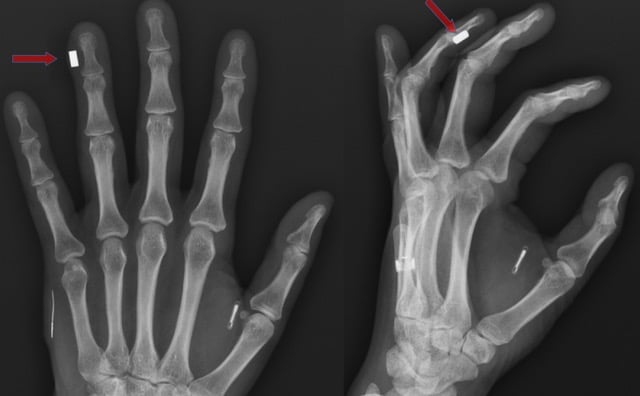More than 4,000 Swedish citizens have opted to have rice grain-sized microchips implanted under their skin, replacing traditional identification cards, bank cards, and access keys in what has become a pioneering technological trend that is reshaping daily life in the Scandinavian nation.
The microchips, which use Near Field Communication (NFC) technology similar to that found in contactless payment cards, are typically implanted between the thumb and forefinger. Users can simply wave their hands near scanners to unlock office doors, access gym facilities, pay for train tickets, and even make purchases at cafes and restaurants.
Sweden’s state-owned railway company, SJ Rail, began accepting the implants as a form of ticket payment in 2017, allowing passengers with the technology to have their hands scanned by conductors instead of showing traditional tickets or mobile passes. The implants contain membership numbers and travel information that can be instantly verified.
At Stockholm’s digital innovation hub, Epicenter, approximately 150 employees have received the implants, which serve as replacements for traditional ID cards and building access passes. The company holds regular “implant parties” where groups of workers receive the chips in social settings, normalising what many outside Sweden might consider a futuristic or even dystopian practice.
“The human body is the next big platform. The connected body is already a phenomenon,” said Hannes Sjöblad, founder of Swedish biohacking group Bionyfiken, which has been organising implant sessions since 2015. “Who wants to carry a clumsy smartphone or smartwatch when you can have it in your fingernail? I think that is the direction where it is heading.”
The chips, developed by companies like DSruptive Subdermals and Biohax International, cost approximately €100 (£85) but can last between 20 to 40 years, making them more cost-effective than wearable devices that require regular replacement. Biohax International, led by former professional body piercer Jowan Österlund, reports being overwhelmed with requests as the technology gains mainstream acceptance.
Twenty-eight-year-old Ulrika Celsing is among those who have embraced the technology. Her implanted microchip has replaced both her gym card and office key card. To enter her workplace, she simply waves her hand near a small scanner and enters a code, eliminating the need to carry multiple cards or worry about losing them.
The trend reflects Sweden’s broader movement away from physical currency and cards. Only one in four Swedes uses cash at least once a week, with retail cash transactions dropping from 40 per cent in 2010 to approximately 15 per cent today. The nation’s central bank, Riksbank, is even developing a digital currency called the e-krona to potentially replace physical cash entirely.
Sweden’s embrace of the technology appears linked to several cultural factors. The country has long been at the forefront of digital innovation, being the birthplace of companies like Skype and Spotify. Additionally, Swedes demonstrate high levels of trust in institutions and technology, with citizens already comfortable sharing personal information such as social security numbers for online purchases and having their salaries publicly accessible through tax authorities.
Digital culture lecturer Moa Petersén from Lund University notes that Sweden’s thriving biohacking scene promotes bio-digital experimentation, creating an environment where such innovations are more readily accepted. “The factors behind why roughly 3,500 Swedes have had microchips implanted in them are more complex than you might expect,” she explained, pointing to the nation’s highly technological society.
During the COVID-19 pandemic, the technology expanded to include digital health passes, with users able to store vaccination records on their implants. DSruptive Subdermals demonstrated how the chips could display PDF vaccination certificates when scanned, adding another layer of functionality to the devices.
However, the technology is not without critics and concerns. Ben Libberton, a microbiologist at MAX IV Laboratory in southern Sweden, warns that the implants could potentially cause infections or trigger immune system reactions. He also raises concerns about future privacy implications as the technology becomes more sophisticated.
“What is happening now is relatively safe. But if it’s used everywhere, if every time you want to do something and instead of using a card you use your chip, it could be very, very easy to let go of personal information,” Libberton cautioned.
Currently, Sweden has no specific national legislation regulating the microchip implant industry, though some experts are calling for lawmakers to monitor developments more closely. Privacy advocates worry about potential surveillance capabilities and data security as the chips become more advanced and widely adopted.
Despite these concerns, many Swedish users remain unconcerned about hacking or privacy breaches. Österlund argues that the chips are actually more secure than many other data storage methods because they are physically embedded under the skin, making them harder to access or steal than traditional cards or smartphones.
The technology is beginning to spread beyond Sweden’s borders. Bionyfiken has organised implant parties in the United States, United Kingdom, France, Germany, and Mexico. In the US, about 50 employees at Wisconsin vending machine company Three Square Market voluntarily received implants in 2017 to use for purchases, computer logins, and photocopier access.
Patrick Mesterton, CEO of Epicenter, envisions expanded capabilities for the technology, including broader payment options and integration with more daily activities. “Having different cards and tokens verifying your identity to a bunch of different systems just doesn’t make sense,” he stated. “Using a chip means that the hyper-connected surroundings that you live in every day can be streamlined.”
As Sweden continues to lead this technological revolution, the implications extend far beyond convenience. The widespread adoption of implanted microchips raises fundamental questions about the future of human-technology integration, privacy rights, and the evolution of payment systems and identification methods.
The Swedish experience serves as a real-world testing ground for technology that could eventually spread globally, offering both a glimpse of potential convenience and a warning about the need for careful consideration of privacy and security implications as humanity moves closer to a truly integrated digital existence.
Follow for more updates on Britannia Daily
Image Credit:
X-ray image (18 February 2022) — photo by Sandra W, licensed under CC BY-SA 4.0.



